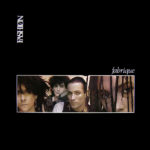
One of the ultimate statements in sleaze. Some Discog commenter put it better than I ever would: “If cocaine were music, this album would be the result.” Helmed by German post-disco mastermind Zeus B. Held and a post-punk quartet from Birmingham, England, Fashion, Fabrique brought them together to create something that vastly outstretched their original influences. Fabrique saw them create something that verges more on intelligent dance music, than electro-anything. Way too sophisticated in their arrangements, and too guttural in their delivery, it was with great pains that the ’80s saw them being lumped in with the sound of Icehouse or Heavy 17 (their far distant, closest parallels). Fashion tapped “rock” instrumentation and punk attitude only as means to lace their electronic joy ride way into slinky grooves that go from dance floor to back-alley. Fashion was too slippery for their own good.
Long overdue a re-release, Fabrique stands out as a solitary diamond in their whole discography. Originally a trio (dubbed Fashion Music) signed by some offshoot of the American I.R.S. record label in 1979, their debut featured something approaching the music of groups like Gang of Four, Magazine, or the Pop Group. Reggae-tinged, melodic post-punk, with natty vocals from all members ruled the season, and little music approaching anything resembling a “hit” followed. For nearly two years the group languished in obscurity, meriting to stay in some dustbin of forgotten punk groups. Things would change though. Enter guitarist De Harris and producer Zeus B. Held.
Completely remaking/remodeling their whole look and sound, Fashion, now a four-piece, embraced the mutant electronic funk of early ’80s America and the post-disco of continental Europe. In 1982’s Fabrique, Fashion went for discotheque hits and signed to a larger label, Arista, to get there. Completely selling out their Birmingham punk roots, Fashion fell hook, line, and sinker for the Germanic techno-pop Zeus B. Held lent to groups like space-disco group Robot and artists like Gina X. If you can view the liner notes of this release, it seems no expense was spared to bring you the ultimate statement in electronic dance rock. Recorded in England, France, and Germany with more digital polysynths than you can ever imagine (or expense), and a set of expensive music videos, Fabrique was supposed to launch them into the musical stratosphere. Guitarist and vocalist De Harris certainly had a certain je ne sais quoi about him, not giving in to any of the other musical tropes of that era.
What happened, though, was that Fashion, at that moment, probably made something too far ahead of the curve. Fashion created something, sonically, far closer to Martin Rushent’s work with the Human League as the League Unlimited Orchestra or New Order (albeit outranking them at their own game…). And when they weren’t aiming for the booty, they created stuff that spoke of ambient and New Age influences (see “You Only Left Your Picture“). No dance floor existed, at least in England, to support the kind of dance they wound up making. Too dubby, too sprawling, too mechanical, too alien with its funk (compared to much out there that was overground), it was Chic during the cocaine hangover. As a DJ, just imagine finding something like “Streetplayer (Mechanik)” to slot next to. Fabrique was simply too new of a wave, for that era’s New Wave. Criminally underrated and forgotten, their only claim to fame is Miami Vice (of all places!) giving them an audience where you could hear and appreciate something you wouldn’t catch on the radio. Everything sounds so amped, yet everything ended so quietly. A “Slow Blue” providing a perfect soundtrack to the techno-promise of the era? Maybe.

One response
Nice piece. I’m writing a book on the making of the album. Look out for a re-mastered re-release of “Fabrique” with my liner notes in the new year.